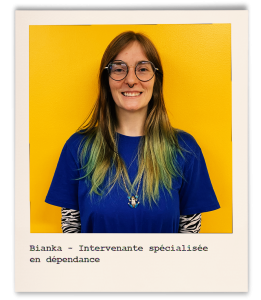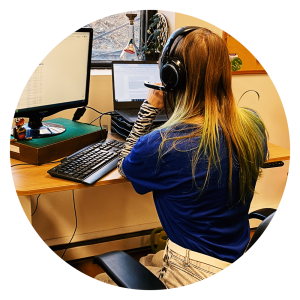In Québec, feelings of loneliness are on the rise. We often talk about seniors being isolated, but it is among younger people that this feeling is prevalent. Loneliness can affect physical and mental health… as well as substance use. We spoke with Bianka, Addiction Counselor for our Drugs: Help and Referral and Gambling: Help and Referral helplines.
Loneliness and addiction: “using acts as an escape”
Why do loneliness and substance use seem so closely linked?
Loneliness brings us into ourselves: we have a lot of free time, especially time to think. Substances can therefore enable us to escape, to worry less about being lonely. Many times, people fear being alone. We live in a world of over-stimulation, with many possibilities, at all times. Having nothing to do and being alone can bring about anxiety. Thus, using can be a way to escape our own thoughts. Substances will generally procure a feeling of well-being, of immediate gratification which can also be found in social interactions and which we may be trying to recreate.
Because of the pandemic, a lot of contacts and relationships were lost, creating even more isolation. There was also more depression and anxiety. Such situations can favour both isolation and substance use.
When we are alone, it becomes harder for us to become aware of a potential substance abuse problem. If someone does not have loved ones worried about them, and who can detect a change in their substance use, there may be no warning signs for them and that can make a person even more vulnerable.
We tend to associate loneliness with alcohol. Is this accurate?
In our society, it is acceptable to have a drink in the evenings, whether alone or not, which could favour problem drinking. However, it really depends on the habits of each. Cannabis is also seen as less of a party drug since its legalization and is used to relax, alone, and fall asleep. But for others, it could very well be stimulants.
The holidays are fast approaching. What are the impacts on people who are alone?
Holidays are a stressful period for a lot of people, but especially for those who are isolated, who know that they may not see their family, may not go out, while everyone else seems excited to be with their loved ones. Feelings of loneliness worsen because the thought of everyone else celebrating while we have no one is painful. Once again, using acts as an escape. Yet the holidays are also a period where using, especially drinking, is omnipresent. There is a certain pressure to be like everyone else. During gatherings, alcoholic drinks are available and are generally offered immediately because everyone assumes that everyone else drinks. While we still question people as to why they are not drinking, we never question why someone is drinking. Some may choose to drink to not endure such pressure and scrutiny.
For people with an addiction, this could be very difficult, even if they are not necessarily lonely. It can also be risky for people without an addiction but who use excessively during the holidays, whether alcohol or other, and eventually develop habits that can become hard to break afterwards.
What can someone do if they notice their loved one slowly self-isolating and using more?
First of all, they should talk about it and use available resources to get support and tools such as helplines like ours. Our team will be able to find resources that can meet their needs.
They can also make sure to keep a line of communication open with their loved one, without pressing things, to show that they are there for them. They can show interest in their needs and help find resources for them: shelter? food aid? something else?
Bianka and her colleague Zeineb are responsible for the Together S.E.D.S. project, a program born from a collaboration between the Suicide Prevention Centre of Montréal and us. This program aims at supporting and empowering people whose loved ones have an addiction and pose a suicidal risk. ” We found that we were getting a lot more calls from people whose loved ones were using a lot and who had suicidal ideations or had even attempted suicide in the past ” explains Bianka. ” Loved ones are very affected by this type of situation and do not know how to help the person. […] We created this partnership to meet this need, and help loved ones, but also to provide them with a certain respite and show them how to think of and take care of themselves. “
What are the resources for someone who is alone, using and who wishes to change their situation?
There are many resources that can help, such as day centres offering activities, organizations providing friendly visits to make sure the person is okay, crisis centres, suicide prevention centres, etc. And of course, our service, Drugs: Help and Referral. We will remain available 24/7 throughout the holidays.
During our interventions, we will look at the person’s plan for the holidays. If they plan on using, our role will not be to convince them otherwise. We will try to establish a safety net together to ensure that when they do use, everything goes as smoothly as possible despite the difficult period. We will also look at what the person enjoys doing and can do: is there an activity they enjoyed in the past and could start up again? a book they could read? Some people who are alone and who use alone suffer from depression and anxiety. We cannot just say ” Break your isolation, go see people ” because at that moment, it may not be possible or a conceivable option. We always adapt ourselves to the person’s situation, wherever they find themselves within this journey.
Ce contenu a été traduit grâce au soutien du Secrétariat aux relations avec les Québécois d’expression anglaise.


